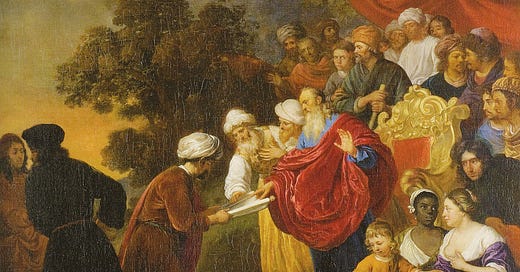Zalman Schneerson - Chapter 2a - Thinking Out Loud
Wisdom of our Fathers, Rabbi Hillel: “In a place where there are no men, strive to be a man.”
On the subject of:

There is a little additional section after chapter two, it’s called – “Thinking Out Loud”:
In front of me, like a stumbling block, a few quotes פסוקים ומאמרי חז"ל They circle in front of my eyes like a moral rebuke אֶל־זְרֻבָּבֶ֖ל לֵאמֹ֑ר לֹ֤א בְחַ֙יִל֙ וְלֹ֣א בְכֹ֔חַ כִּ֣י אִם־בְּרוּחִ֔י אָמַ֖ר יְהֹוָ֥ה צְבָאֽוֹת .1 particularly according to the teaching of chassidus זרובבל the scattered masses of Jews, Bovel is a symbol of exile כישם בבל mixed among the nations זרו their seed is scattered ט֤וֹב אֶ֣רֶךְ אַ֭פַּיִם מִגִּבּ֑וֹר וּמֹשֵׁ֥ל בְּ֝רוּח֗וֹ מִלֹּכֵ֥ד עִֽיר .2 one more quote הִשְׁבַּעְתִּי אֶתְכֶם בְּנוֹת יְרוּשָׁלִַם בִּצְבָאוֹת אוֹ בְּאַיְלוֹת הַשָּׂדֶה אִם תָּעִירוּ וְאִם תְּעוֹרְרוּ אֶת הָאַהֲבָה עַד 3 שֶׁתֶּחְפָּץ. on the other hand, contradicting is a different quote, a reproach to Jews לסטים אתם שכבשתם ארצות שבעה גוים reproach that we answer כל הארץ של הקב"ה היא; הוא בראה ונתנה לאשר ישר בעיניו. ברצונו נתנה להם, וברצונו נטלה מהם ונתנה לנו all of this is tormenting my soul......... כי אם ברוחי Only through spirit, not by force. I understand, spirit doesn't mean that we don't have to do a thing. It doesn't mean that after we rise spiritually, we lift with us the broader masses. This requires practical measures, of course, practical measures for the dissemination of our teaching, which is a prerequisite, condition, and basis of the ברוחי To achieve this, you also need funds, money. We have to work. But the work of the spirit itself, is it sufficient, so to speak? I understand: It's not enough. It is necessary to work to raise the spirit of the Jews (to put it in a formulaic way), but also for the body of a Jew, bread, employment, rights, shelter. The first Jew, Abraham, started in this way, not from the spirit but from an oasis in the desert. First hospitality for a suffering and exhausted traveler, and then the purpose and meaning of life. I understand, but it means only work, work primarily on oneself, work to carry out well-known ideas to the masses, work finally to help people. In general, this what such men of the spirit as the first Lubavitch Rabbi until the Lubavitch Rabbi of our time did. But only labor, not the use of force, and to use force - never? No? The obstacles standing in the way of the Lubavitcher Rabbi, because of these hundreds of thousands of visible and invisible, large and even smaller obstacles to the implementation of ideology. The Lubavitcher Rabbi is ill. So, here it will be ברוחי, to suffer, powerless protesting amidst the general bacchanalia of life, and at the same time seeing thousands of dear beings fall morally, without you being able to help them? And this will be ברוחי?
P.S.
I have the feeling there is more to this work, especially, SZS keeps calling it “digressions”… Also note that the Paris story, the beating in Kremenchug and this drosha were likely written during the war. So, he is talking about Ukrainian pogroms but thinking somewhere else. Not being able to hate on a different level.
In fact, to sustain this writing in Russian (any language) there must be a habit, practice. I used to write in Russian very well, but I haven’t written (or spoken really) in a while. I have lost my written fluency, more than that.
I didn’t want to say it, and it doesn’t really relate to the story. In 1919, Zalman Schneerson was 21, assuming that his friend was around his age, two young men, couldn’t take on one drunk Ukrainian, at least offer a resistance? This luck of any physicality is a plague of the Jewish European culture. And the big part of the story of the pogroms and shoa. Is exactly this ברוחי taken to the extreme?
These few poetic pages, SZS was touching something that was vital, not only to him. He is being cryptic. It ends with a question mark.



He was congenitally handicapped with a displaced hip.